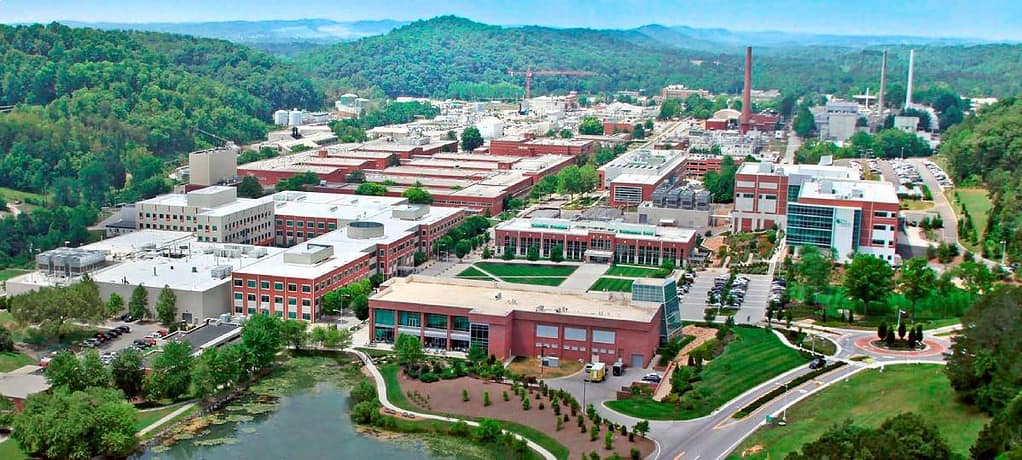The Department of Energy’s Oak Ridge National Laboratory had a major presence at this year’s International Conference for High Performance Computing, Networking, Storage, and Analysis (SC24).
A research team led by the University of Melbourne, with Dmytro Bykov from the Computing and Computational Sciences Directorate at ORNL, took home the top award of the weekend, earning the Gordon Bell Prize for their work using the Frontier supercomputer to perform quantum molecular dynamics simulation 1,000 times larger and faster than previous simulations.
Frontier was also used by a Gordon Bell winning team from King Abdullah University of Science and Technology for their work in climate modeling. The researchers developed an exascale climate emulator that provides enhanced resolution with substantially less computational costs and data storage needs of traditional climate models.
Held this year in Atlanta, Georgia from November 17-22, the conference welcomed more than 18,000 attendees interested in the latest technologies and breakthroughs in high-performance computing and artificial intelligence.
“Our deep involvement in SC24 reflects our enduring commitment to advancing computing, from HPC to AI to quantum,” said Gina Tourassi, who serves as associate laboratory director for Computing and Computational Sciences at ORNL. “The computing facilities and expertise offered by ORNL are second to none and it’s nice to see that recognized yet again this year. From leading technical workshops to showcasing innovative demos and receiving recognition for our contributions, our team’s extensive participation demonstrates our dedication to pushing the boundaries of supercomputing and collaborating with the global HPC community.”
Other winners from ORNL include lab researchers Steven Hahn, Philip Fackler, William F. Godoy, Ketan Maheshwari, Zachary Morgan, Andrei Savici, Christina Hoffmann, Pedro Valero-Lara, Jeffrey Vetter, and Rafael Ferreira da Silva, who earned a Best Paper award for their work integrating ORNL’s cutting-edge computing testbeds at the lab’s Oak Ridge Computing Leadership Facility with the Spallation Neutron Source.
“Future software investments following this proposed direction towards performance portability not only speeds up execution time from hours to minutes but also enables efficient workflows comparing advanced modeling and simulation run on supercomputers to an ever-increasing quantity of experimental data,” said Steven Hahn, who serves as a data analysis software engineer at ORNL. “Receiving this recognition at XLOOP (held in conjunction with SC24) validates our work from the multidisciplinary community of experts connecting large-scale experimental science with high-performance computing user facilities.”
Mariam Kiran, who serves as group leader for Quantum Communications and Networking at ORNL and research scientist Anees Al-Najjar were part of a multi-institutional team featuring ORNL, Caltech and University of Brazil that took home a best paper award for showcasing how their real-time traffic prediction tool can change traffic paths using source routing.
ORNL’s ORBIT team (Oak Ridge Base AI Foundation Model for Earth System Predictability), which includes researchers Ming Fan, Jong-Youl Choi, Prasanna Balaprakash, Junqi Yin, Dan Lu, Wei Zhang, Xiao Wang, Aristeidis Tsaris and Siyan Liu, took home the HPCwire Top Supercomputing Achievement award. A spatiotemporal transformer model with 113 billion parameters, ORBIT is rapidly advancing AI-driven weather modeling by enhancing computing efficiency and prediction accuracy.
In addition to the numerous accolades, ORNL researchers were also included as featured speakers throughout the weeklong event. High performance computing system engineer Woong Shin and postdoctoral research associate Matthias Maiterth presented on HPC energy efficiency; R&D staff and group leader Ramanan Sankaran discussed bringing national lab scale supercomputing to industries across the country; and Director of Science Bronson Messer gave a keynote address on the promise of exascale supercomputing.
“The supercomputing conference is an important venue to meet with collaborators and partners to discuss ongoing and forward-looking computational science initiatives at the laboratory,” said Arjun Shankar, who serves as division director for the National Center for Computational Science at ORNL.
Several researchers also provided in depth demonstrations to showcase their continued groundbreaking work across ORNL’s multiple research areas.
UT-Battelle manages ORNL for the Department of Energy’s Office of Science, the single largest supporter of basic research in the physical sciences in the United States. The Office of Science is working to address some of the most pressing challenges of our time. For more information, please visit energy.gov/science. – Mark Alewine
This Oak Ridge National Laboratory news article "Calculations on Frontier earns Gordon Bell Prize, ORNL major presence at SC24" was originally found on https://www.ornl.gov/news

